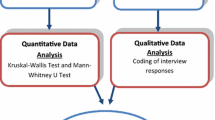Abstract
This paper reports a study designed to explore prospective teachers' learning to teach mathematics in the complex context of a university-based curriculum and instruction course. The course, taught with a focus on inquiry, used prospective teachers' weekly interactions with students as springboards for investigations of mathematics, teaching, and learning. A framework of questioning, listening, and responding is used to analyze prospective teachers' understandings and the tensions they experienced. The difficulties and tensions prospective teachers face in turn pose challenges and tensions for teacher educators.
Similar content being viewed by others
REFERENCES
Ball, D.L.: 1990, 'Breaking with experience in learning to teach mathematics: The role of a preservice methods course', For the Learning of Mathematics 10(2), 10–16.
Ball, D.L.: 1996, 'Teacher learning and the mathematics reforms: What we think we know and what we need to learn', Phi Delta Kappan 77, 500–508.
Behr, M., Harel, G., Post, T. and Lesh, R.: 1992, Rational number, ratio, and proportion. in D. Grouws (ed.), Handbook of research on mathematics teaching and learning. Macmillan, New York, pp. 296–333.
Bird, T., Anderson, L. Sullivan, B. and Swindler, S.: 1993, 'Pedagogical balancing acts: Attempts to influence prospective teachers' beliefs', Teaching and Teacher Education 9, 253–267.
Carter, K.: 1994, 'Preservice teachers' well-remembered events and the acquisition of event-structured knowledge', Journal of Curriculum Studies 26, 235–252.
Carter, K. and Anders, D.: 1996, 'Program pedagogy', in F. Murray (ed.), The teacher educator's handbook: Building a knowledge base for the preparation of teachers, Jossey-Bass, San Francisco, pp. 557–592.
Christensen, C.R.: 1991, 'The discussion teacher in action', in C.R. Christensen, D. Garvin, A. Sweet (eds.), Education for judgment: The artistry of discussion leadership, Harvard Business School Press, Boston, MA, pp. 153–172.
Crespo, S.: 1998, 'Math penpals as a context for learning to teach: A study of preservice teachers' learning', Unpublished doctoral dissertation, University of British Columbia, Vancouver, B.C.
Doyle, W.: 1990, 'Themes in teacher education research', in R. Houston (ed.), Handbook of research on teacher education, MacMillan, New York, pp. 3–24.
Feiman-Nemser, S. and Buchmann, M.: 1986, 'Pitfalls of experience in teacher preparation', in J. Raths and L. Katz (eds.), Advances in teacher education, Vol. 2, Albex, Norwood, NJ, pp. 61–73.
Greer, B.: 1992, 'Multiplication and division as models of situations', in D. Grouws (ed.), Handbook of research on mathematics teaching and learning, MacMillan, New York, pp. 276–295.
Glaser, B. and Strauss, A.: 1967, The discovery of grounded theory: Strategies for qualitative research. Aldine, Chicago.
Gore, J.: 1991, 'Practicing what we preach: Action research and the supervision of student teachers', in R. Tabachnich and K. Zeichner (eds.), Issues and practices in inquiry-oriented teacher education, Falmer Press, London, pp. 253–272.
Heaton, R. and Lampert, M.: 1993'Learning to hear voices: Inventing a new pedagogy of teacher education', in D. Cohen, M. McLaughlin, J. Talbert (eds.), Teaching for understanding: Challenges for policy and practice, Jossey-Bass, San Francisco, pp. 43–83.
Hoechsmann, K.: 1996, 'The challenge of multiplicative thinking', Paper presented at the British Columbia Association of Mathematics Teachers fall conference, October 1996, New Westminster, British Columbia.
Holt-Reynolds, D.: 1992, 'Personal history-based beliefs as relevant prior knowledge in course work', American Educational Research Journal, 29, 325–349.
Jaworski, B.: 1992, 'Mathematics teaching: What is it?', For the Learning of Mathematics, 12(1), 8–14.
Kagan, D.: 1992, 'Professional growth among preservice and beginning teachers', Review of Educational Research, 62, 129–169.
Lampert, M.: 1990, 'When the problem is not the question and the solution is not the answer: Mathematical knowing and teaching', American Educational Research Journal, 27, 29–63.
Lampert, M., Heaton, R. and Ball, D.L.: 1994, 'Using technology to support a new pedagogy of mathematics teacher education', Journal of Special Education Technology, 12(3), 276–289.
National Council of Teachers of Mathematics: 1989, Curriculum and evaluation standards for school mathematics. Reston, VA.
National Council of Teachers of Mathematics: 1991, Professional standards for teaching mathematics. Reston, VA.
National Council of Teachers of Mathematics: 1995, Assessment standards for school mathematics. Reston, VA.
Nicol, C.: 1997, 'Learning to teach prospective teachers to teach mathematics'. Unpublished doctoral dissertation, University of British Columbia, Vancouver, B.C.
Patton, M.: 1990, Qualitative evaluation and research methods, Sage, Newbury Park, CA.
Richards, J.: 1991, 'Mathematical discussions', in E. von Glasersfeld (ed.), Radical Constructivism in mathematics education, Kluwer Academic Publishers, Dordrecht, The Netherlands, pp. 13–51.
Richardson, V.: 1996, 'The case for formal research and practical inquiry in teacher education', in F. Murray (ed.), The teacher educator's handbook: Building a knowledge base for the preparation of teachers, Jossey-Bass, San Francisco, pp. 715–737.
Wassermann, S.: 1994, Introduction to case method teaching, Teachers College Press., New York.
Watson, J.: 1988, 'Three hungry men and strategies for problem solving', For the Learning of Mathematics, 8(3), 20–26.
Author information
Authors and Affiliations
Rights and permissions
About this article
Cite this article
Nicol, C. Learning to Teach Mathematics: Questioning, Listening, and Responding. Educational Studies in Mathematics 37, 45–66 (1998). https://doi.org/10.1023/A:1003451423219
Issue Date:
DOI: https://doi.org/10.1023/A:1003451423219




